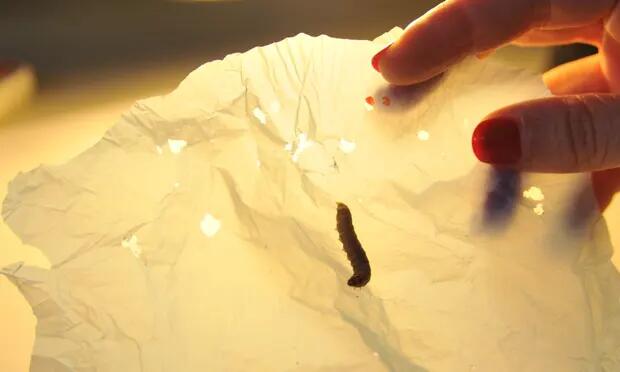Plastic pollution is a major problem worldwidely
Polyethylene (PE) is a widely used material that comprises about 30% of polyester products which range from pipes, flooring, bottles to bags and packaging. This long-lasting material is cheap and durable, highly resistant to oxygen which means it is hard and slow to degrade in nature.
Millions of tonnes of plastic are consumed every single year, while a very small part is collected and recycled, leaving majority dumped into ocean or dumped in the landfill, not possible to degrade in hundreds of years.

A full recycling system can reduce new virgin plastic made from oil. KINGMAX has been working on that - use recycled PET bottles to make new microfiber products (see rPET microfiber collection). Meanwhile, seeking more ways to degrade plastic would be valuable topics for scientists.

Worm saliva breaks down tough plastic
A newly published research in the journal Nature Communications, identified two types of enzymes identified in the wax worm saliva had the plastic-eating effect. “This study suggests insect saliva might [be] a depository of degrading enzymes which could revolutionize the bioremediation field,” the researchers said.
The discovery is initially found by one scientist, also an amateur beekeeper, when he was cleaning an infested hive and saw the larvae ate holes in a plastic bag.

Wax worm saliva rapidly breaks down plastic bags, scientists discover.
One hour's exposure to the wax worm saliva degrades the plastic as much as years of weathering. Another important founding is that its enzymes can degrade polyethylene at room temperature, without any heating.
"We imagine you could apply this new understanding to large plastic waste management facilities," said Dr Federica Bertocchini, a co-author on the paper, "But you could also have a home-based kit which could help you degrade your own plastic."

One day, if the enzymes can be easily synthesized, it would help to overcome a bottleneck in plastic degradation, the researchers said, which is the initial breaking of the polymer chains. They hope the breakthrough will lead to new natural approaches to deal with plastic pollution.
Reference: Sanluis-Verdes A, Colomer-Vidal P, Rodriguez-Ventura F, et al. Wax worm saliva and the enzymes therein are the key to polyethylene degradation by Galleria mellonella. Nat Commun. 2022;13(1):5568. doi:10.1038/s41467-022-33127-w
